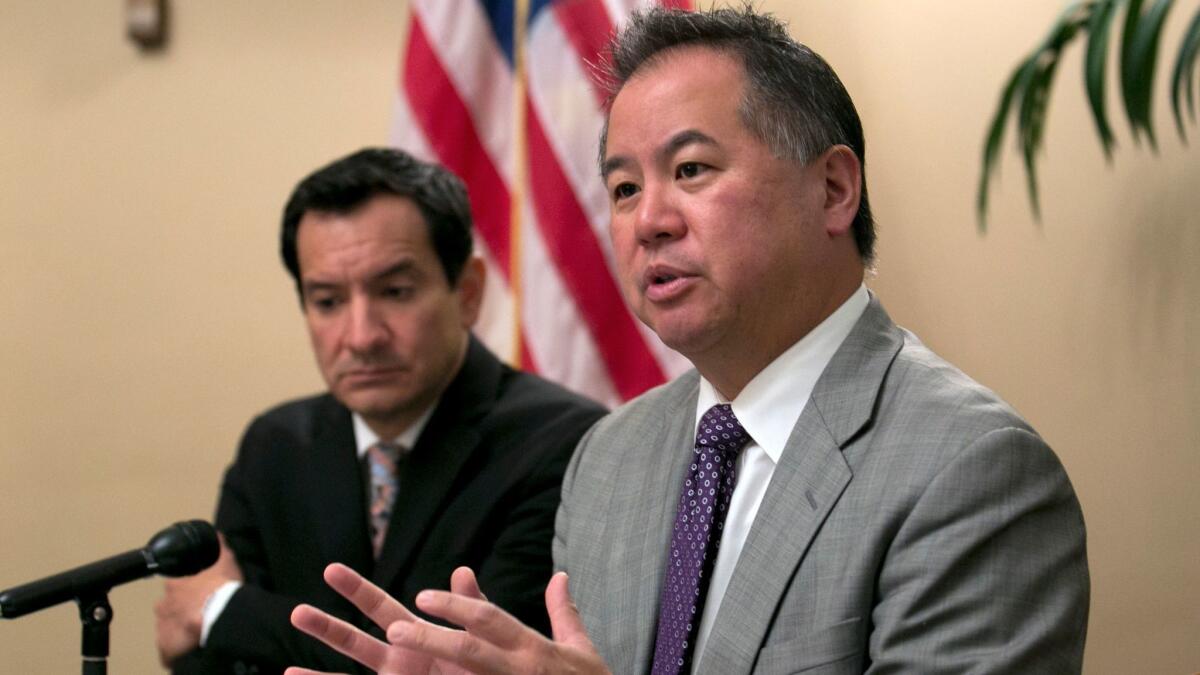California bill would make police body camera videos public

Reporting from Sacramento â New legislation from a Bay Area assemblyman would dramatically expand public access to police body camera videos in California.
The measure, Assembly Bill 748 from Assemblyman Phil Ting (D-San Francisco), would make public footage from police shootings and other cases considered to be in the public interest, such as police uses of force or violent political protests.
âRight now in many communities thereâs a level of distrustâ with law enforcement, Ting said. âI believe that having more transparency, more openness will create more trust on both sides.â
Tingâs legislation seeks to break a stalemate at the state Capitol on whether to ensure public access to body camera videos. The technologyâs use has proliferated after protests over disputed law enforcement incidents began in earnest following the 2014 police shooting of Michael Brown in Ferguson, Mo.
Since then, lawmakers have been deadlocked over whether the public should be allowed to see the videos, reflecting an intraparty split among Californiaâs ruling Democrats over the deference given to local law enforcement. Without statewide rules, police departments have generally considered the footage to be potential criminal evidence that is exempt from disclosure under Californiaâs public records laws, and they donât make the videos public outside of a courtroom. In some high-profile cases, such as disputed police shootings in El Cajon and Los Angeles, law enforcement officials have publicly revealed surveillance footage in hopes of quelling protests. The Los Angeles Police Commission is currently studying whether the LAPD should release body camera videos.
Ting said the rules should be the same across California so everyone would know when footage would be released.
âThere is clearly a need to have clear and consistent guidelines across the board,â he said.
The legislation renews debates over whether the state should err on the side of transparency or privacy when considering the videosâ public release. Under the bill, police departments could still hold videos back permanently by arguing that privacy concerns outweigh the public interest or withhold them for up to three months if they believe the release would substantially impede an active investigation.
But Cory Salzillo, legislative director for the California State Sheriffsâ Assn., said the bill ignores the unique circumstances facing criminal and internal investigators. The decision over whether to release footage should continue to be in the hands of local police and prosecutors, he said.
âNo two cases are alike,â Salzillo said.
Other states are grappling with similar concerns. Nearly two dozen states have passed legislation regulating public access to camera footage, according to the nonprofit Reporters Committee for Freedom of the Press. In most cases, the bills have restricted some public availability of the videos. Last month, Pennsylvania lawmakers passed a measure blocking the release of police body camera and dashboard camera videos.
Tingâs proposal, which is being introduced late in the legislative year, would have to clear both houses of the Legislature before lawmakers adjourn in mid-September. The bill is scheduled for its first hearing next week in the Senate Public Safety Committee.
ALSO
Police transparency reaches a stalemate at the Capitol
Updates on California politics
More to Read
Get the L.A. Times Politics newsletter
Deeply reported insights into legislation, politics and policy from Sacramento, Washington and beyond. In your inbox three times per week.
You may occasionally receive promotional content from the Los Angeles Times.











